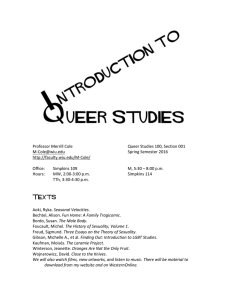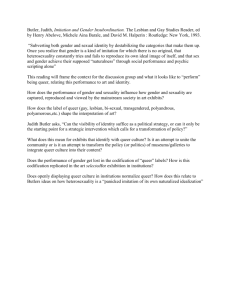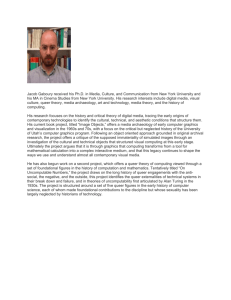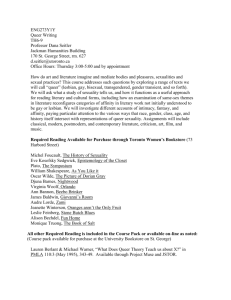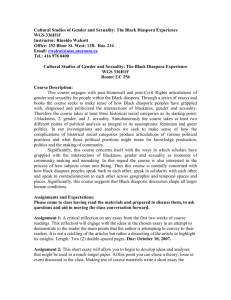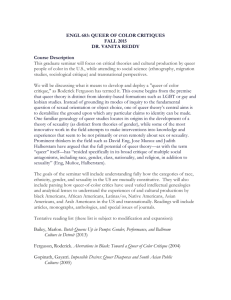275 Syllabus SP15 Col+
advertisement
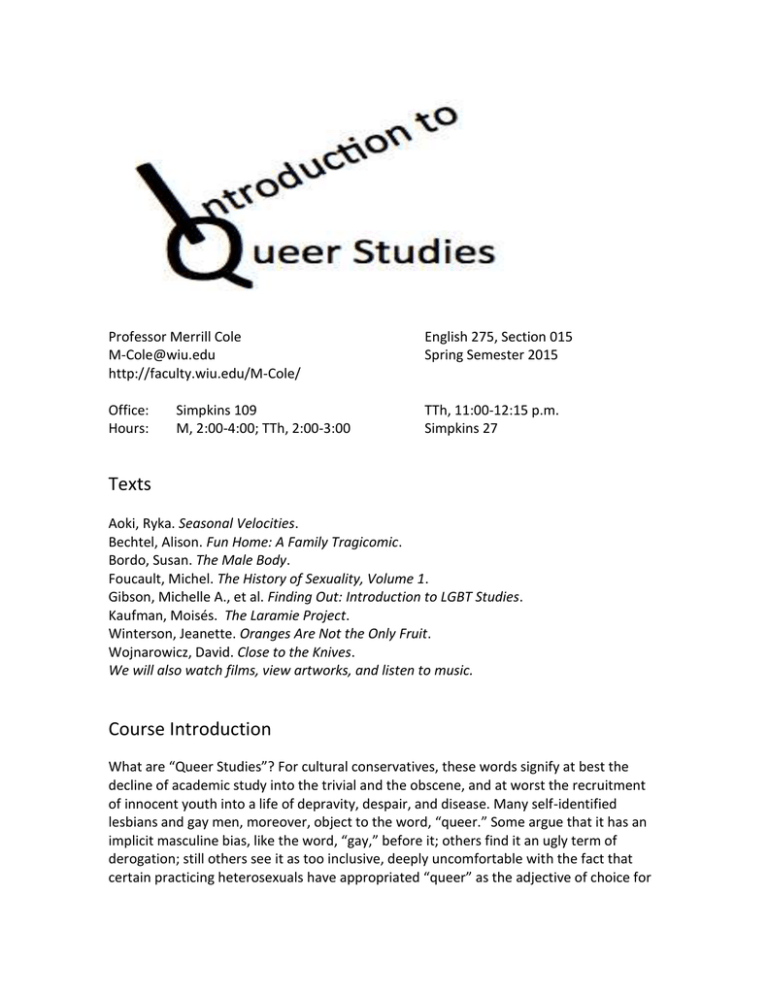
Professor Merrill Cole M-Cole@wiu.edu http://faculty.wiu.edu/M-Cole/ English 275, Section 015 Spring Semester 2015 Office: Hours: TTh, 11:00-12:15 p.m. Simpkins 27 Simpkins 109 M, 2:00-4:00; TTh, 2:00-3:00 Texts Aoki, Ryka. Seasonal Velocities. Bechtel, Alison. Fun Home: A Family Tragicomic. Bordo, Susan. The Male Body. Foucault, Michel. The History of Sexuality, Volume 1. Gibson, Michelle A., et al. Finding Out: Introduction to LGBT Studies. Kaufman, Moisés. The Laramie Project. Winterson, Jeanette. Oranges Are Not the Only Fruit. Wojnarowicz, David. Close to the Knives. We will also watch films, view artworks, and listen to music. Course Introduction What are “Queer Studies”? For cultural conservatives, these words signify at best the decline of academic study into the trivial and the obscene, and at worst the recruitment of innocent youth into a life of depravity, despair, and disease. Many self-identified lesbians and gay men, moreover, object to the word, “queer.” Some argue that it has an implicit masculine bias, like the word, “gay,” before it; others find it an ugly term of derogation; still others see it as too inclusive, deeply uncomfortable with the fact that certain practicing heterosexuals have appropriated “queer” as the adjective of choice for 2 their own activities. Often queer activists outside academia disparage “queer studies,” along with its kissing cousin, “queer theory,” as ivory tower mumbo-jumbo, useless to people’s everyday struggles. Even queer studies supporters disagree about what this newly-emerging field should become. Yet the discipline of queer studies provides indispensable tools for studying sexual diversity, the diversity that this class will explore in a variety of media, including literature, film, and visual art. It will also provide historical context and delve into political controversies. Queer studies does not simply affirm non-normative sexuality, but interrogates the meaning of human eroticism in all of its forms, including the heterosexual. It offers powerful modes of social critique. Perhaps this conjunction of sex and study appears nonsensical, or silly. Listen, then, to the words of Audre Lorde: “Our erotic knowledge empowers us, becomes a lens through which we scrutinize all aspects of our existence, forcing us to evaluate those aspects honestly in terms of their relative meaning within our lives. And this is a grave responsibility, projected from within each of us, not to settle for the convenient, the shoddy, the conventionally expected, nor the merely safe.” Requirements Introduction to Queer Studies (IQ) involves two five-page analytical essays, one personal narrative, and a final, self-reflective essay. You will receive an assignment sheet for each. For most classes, I will assign two students, on a rotating basis, the responsibility to fashion five typed discussion questions. The questions should be handed in at the end of the session. Participation means doing the readings and joining in class discussion regularly. Please see <http://www.wiu.edu/provost/student/> for student rights & responsibilities. Grading Participation: Homework: Discussion Questions: Personal Narrative: First Essay: Second Essay: Self-Reflective Essay: 20% 10% 10% 10% 20% 20% 10% 3 Missing classes, or arriving late, will affect the participation grade. A student with more than three unexcused absences automatically fails the course. I am lenient, though: if you give me a valid reason to miss, or to have missed, a session, I will probably excuse you (I may ask for documentation.). Please let me know, if you have another class or responsibility right before our session begins that prevents you from arriving on time. Whenever you arrive late, it is your responsibility to make sure I’ve recorded your attendance. All essays, except the Self-Reflective Essay, can be rewritten. Visiting My Office Please take the opportunity to meet with me during my office hours, or by appointment, to talk about the readings, or your writing. I very much appreciate any kind of feedback about the course. Students with Disabilities In accordance with University policy and the Americans with Disabilities Act (ADA), I will make academic accommodations for any student who notifies me of the need. For me to provide the proper accommodation(s), you must provide me documentation from Disability Support Services. It is imperative that you take the initiative to bring such needs to my attention, as I am not legally permitted to ask. Students who require special assistance in emergency evacuations (i.e., fire, tornado, etc.) should tell me the most appropriate procedures to follow. Please contact Disability Support Services at 298-2512. Schedule I am open to making changes to keep the learning situation active and dynamic. January 20: January 22: Introduction to the course. Finding Out: Chapter 1; Oranges Are Not the Only Fruit, 1-49. January 27: January 29: Oranges Are Not the Only Fruit, 51-124. Finding Out: Chapter 2; finish Oranges Are Not the Only Fruit. February 3: February 5: Finding Out: Chapter 3; My Beautiful Laundrette (film). My Beautiful Laundrette (film). The Laramie Project, Introduction-49. 4 February 10: February 12: Finding Out: Chapter 4; finish The Laramie Project. LINCOLN’S BIRTHDAY February 17: February 19: Essay One Due. Tough Guise (film). Finding Out: Chapter 5; The Male Body, 3-35. February 24: February 26: Finding Out: Chapter 6; The Male Body, 36-104. The Male Body, 107-52. March 3: March 5: Finding Out: Chapter 7; The Male Body, 153-225. Seasonal Velocities, 3-29. March 10: March 12: Finding Out: Chapter 8; Seasonal Velocities, 33-102. Seasonal Velocities, 105-39. History of Sexuality, 3-13. SPRING BREAK March 24: March 26: Personal Narrative due. History of Sexuality, 15-73. Finding Out: Chapter 9; History of Sexuality, 75-114. March 31: April 2: Finding Out: Chapter 10; finish History of Sexuality. Fun Home, 1-86. April 7: April 9: Finding Out: Chapter 11; Fun Home, 87-150. CLASS CANCELED April 14: April 16: Second Essay due. Damned in the USA (film). Finding Out: Chapter 12; finish Fun Home. April 21: April 23: Finding Out: Chapter 13; Close to the Knives, 3-23. Close to the Knives, 24-63. April 28: April 30: Finding Out: Chapter 14; Close to the Knives, 64-110. Close to the Knives, 111-23; 138-62. May 5: May 7: Finding Out: Chapter 15. Selected Reading TBA. Selected Reading TBA. The Self-Reflective Essay is due in my office on Monday, May 11 by 2:00 p.m. (MS Word email submissions also accepted).
